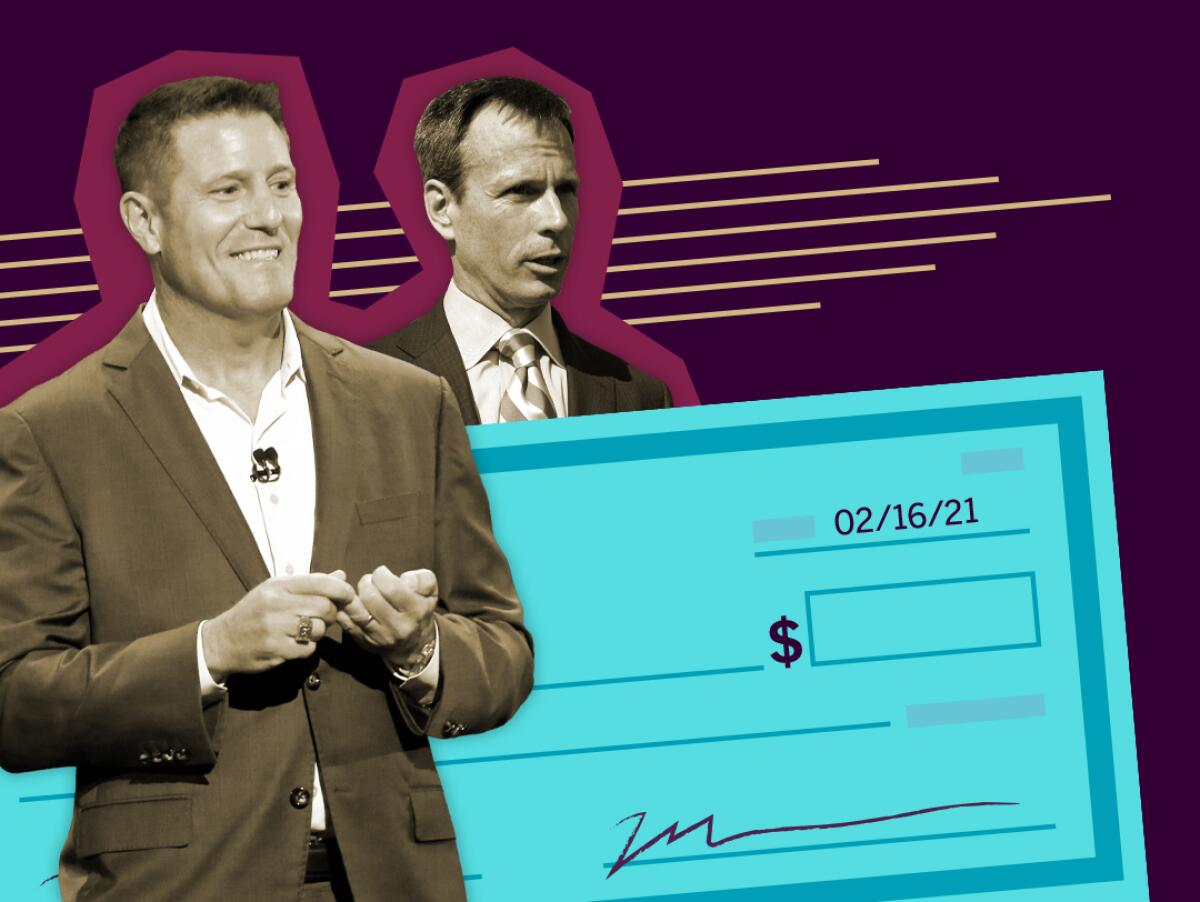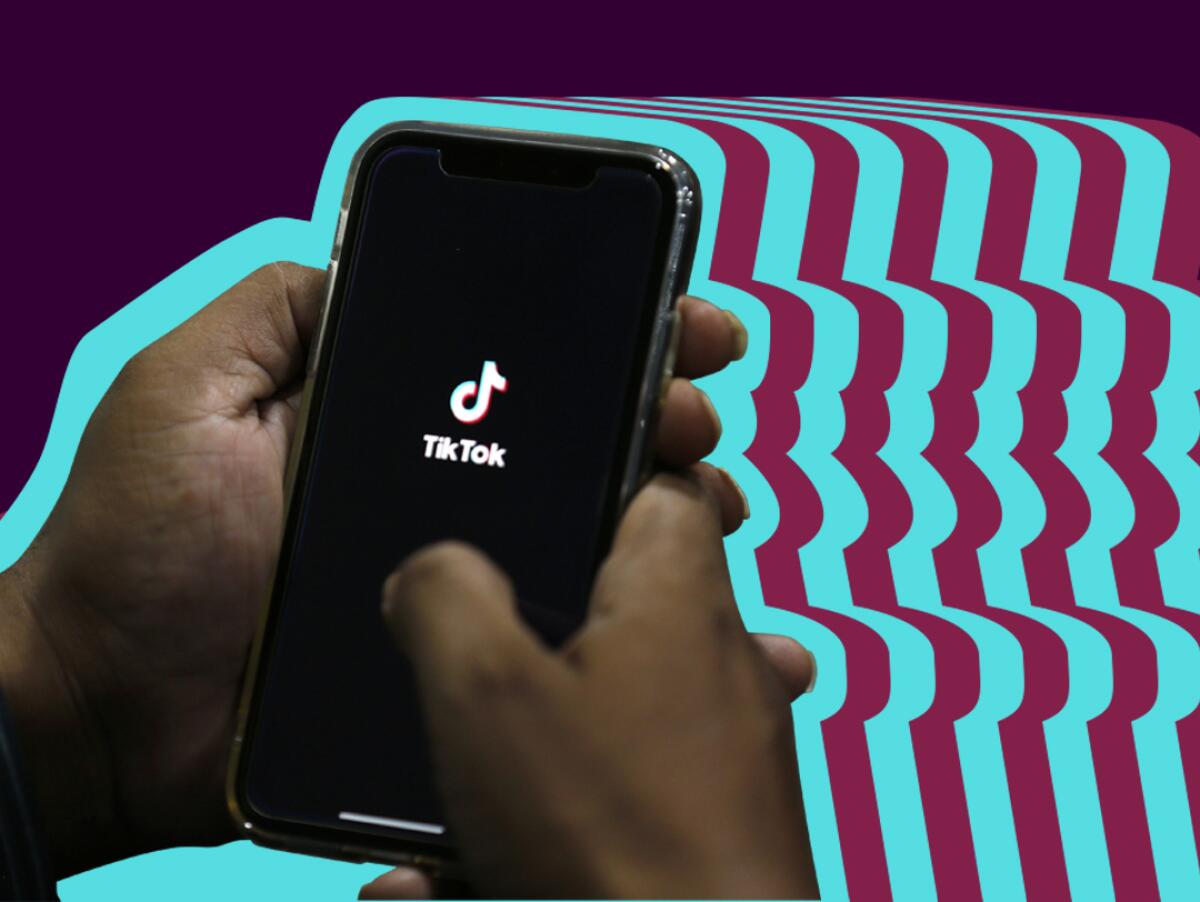The Wide Shot: Why Hollywood is obsessed with SPACs

- Share via
For former studio executives charting their next course, there’s no hotter market than SPACs.
Short for special purpose acquisition company, this once-obscure investment vehicle, also known as a blank-check company, has joined private jets, yachts and Beverly Hills mansions as a Hollywood status symbol.
According to former Techcrunch media columnist Eric Peckham’s SPAC database, there are 26 of these shell companies looking to capitalize on the growing and fragmented industry of digital media, entertainment and gaming.
Just last week, the $300-million SPAC led by former Disney higher-ups Kevin Mayer and Tom Staggs (Shaquille O’Neal is a strategic advisor) announced a deal to merge with Santa Monica-based fitness video app Beachbody and connected workout equipment maker Myx Fitness. Combined company valuation: $2.9 billion.
Harry E. Sloan and Jeff Sagansky, both former entertainment executives and serial SPACers, announced their latest such shell company in December, with the aim of raising $1.5 billion.
Former Dick Clark Productions CEOs Michael Mahan and Allen Shapiro last month raised $200 million through the IPO of their Bright Lights Acquisition Corp. Peter Guber of Mandalay Entertainment sits on the board.
Longtime media investors, including Liberty Media and Raine Group, have SPACs, too.
These entities are hot throughout the investment space. Including all industries, SPACs have raised more than $44 billion so far this year in the United States, according to SPAC Insider. They generated $83 billion for all of 2020.
“They’re not just piling into media and entertainment, they’re piling into anything,” said New York-based SPAC Insider founder Kristi Marvin, who started working on SPACs in 2005 during her investment banking days. “Anyone who’s a dealmaker in that arena, or has a name attached, is getting into the SPAC game.”
Inside the business of entertainment
The Wide Shot brings you news, analysis and insights on everything from streaming wars to production — and what it all means for the future.
You may occasionally receive promotional content from the Los Angeles Times.
SPACs are companies whose sole purpose is to raise money on Wall Street to go out and buy real companies. Once a SPAC raises the capital it wants through an IPO, the company looks for something to acquire and thus take public. Harvard has a thorough rundown here.
Going public through a SPAC appeals to companies that need to raise cash but are iffy about the scrutiny of a normal pre-IPO roadshow. A SPAC can point to the growing digital media space (“Look, the attention economy is booming!”) without having to justify the valuation of a specific studio, short-form streaming app or entertainment business newsletter. However, if the SPAC’s shareholders don’t like the proposed deal, they can take their money back.
Blank-check companies have been around for a long time, but they started to look like good alternatives when the coronavirus crisis dried up an already shaky IPO market as well as private capital. Plus, they got a massive boost of legitimacy through headline-making deals, such as when space travel company Virgin Galactic went public through a SPAC in 2019, raising $480 million.
Additionally, the banks that run the SPACs like having high-profile executives as sponsors because they can draw attention and establish legitimacy with the investment community.
For lifelong dealmakers like Mayer — known as the architect of Disney+ and key acquisitions of Marvel Entertainment, Pixar, Lucasfilm and Bamtech — the SPAC market has clear appeal. It lets them get in on exciting and potentially lucrative “growth areas” in the tech and media space.
“These guys love it,” Marvin said. “They’re kind of nearing retirement but they’ve built up all this knowledge.”
Plus, Marvin said, “There’s a little bit of FOMO involved.”
There’s no guarantee that SPACs sponsored by ex-studio executives will all invest in entertainment, though.
Take Mayer and Staggs, the executives who came closest to getting Bob Iger’s CEO job at Disney without actually succeeding him. The business of their former employer isn’t obviously related to Beachbody — known for the P90X workout fad, Shakeology drinks and multilevel marketing — unless you count Disney’s ties to sports through ESPN. Beachbody is arguably entertainment-adjacent because it makes video content, but so do those workplace safety training firms.
“Beachbody is a high-quality digital content and fitness products company poised to benefit from three powerful market trends: digital subscriptions, connected fitness and growing consumer demand for health and wellness,” Staggs said in a statement. “We also see additional opportunities for M&A and growth down the line as they further expand their platforms and reach and we look forward to helping them maximize those opportunities.”
Separately from their SPAC, Mayer and Staggs are exploring a roll-up of independent media and entertainment companies including Scooter Braun’s Ithaca Holdings and Ben Silverman’s Propagate Content, according to the Hollywood Reporter.
Mayer, in his statement announcing the deal, compared the Beachbody roll-up to his work building Disney’s direct-to-consumer business: “I see many parallels at Beachbody with the work we did at Disney, where we aggressively accelerated our digital transformation and leveraged our content to build Disney+, ESPN+ and Hulu.”
It’s an intriguing comparison. Combining content with streaming services and a strong brand worked wonders for Disney. Putting together content and hardware has a more complicated track record in entertainment, but it makes sense in the at-home fitness space.
Entertainment connection or not, the SPAC backers clearly see an expanding market for home workouts among folks who don’t want to pay as much as Peloton is charging for its bikes.
Still, the SPAC boom may be limited in Hollywood. For one thing, there aren’t that many big targets in the media and entertainment space, which is why you’ll probably see more of these vehicles looking at mobile games, esports and fitness apps.
MGM has considered going public through a SPAC. Quibi also explored the idea, though in its case that clearly didn’t work out.
With the market so crowded with SPACs and fewer companies available to buy, at some point, they will begin to drop. SPACs die if they can’t find an acquisition target that works within two to three years.
TikTok’s revenge

It’s been a big couple of weeks for TikTok.
The Biden administration reportedly is reviewing the Chinese-owned video-sharing app’s deal with Oracle and Walmart, which TikTok made under threat of being banned by a Trump executive order. Whatever comes of the review, any deal probably will look different from what the companies presented. Biden also has called for a pause to the Trump administration’s attempt to ban WeChat.
No surprise there. What’s more interesting is the string of wins the ByteDance-owned TikTok has racked up.
Among them: an expanded deal with Universal Music (and the music label’s concurrent broadside against would-be rival Triller), which suggests the social media phenomenon is here for the long haul. As Wendy Lee reported Monday, creators who momentarily considered switching to rivals as a hedge against TikTok’s possible demise aren’t going anywhere. And more customers are signing up.
“After a steady decline in monthly installs, TikTok in the U.S. began to see an uptick again in December, with a 33% increase over November to 5.7 million installs, according to San Francisco mobile research firm Sensor Tower,” Lee reported. “That boost continued into January, with a 5% increase in installs, the firm estimates.”
Additionally, many TikTok influencers just found out their work now qualifies them to join SAG-AFTRA, giving the medium a sort of coming-of-age moment.
Number of the week

Our Disney earnings headline went with the 95 million subscriber milestone Disney+ announced last week. The company added 21 million subscribers in one quarter. But come on, you know you really want to talk about ARPU (average revenue per user), amusingly pronounced “arr-pooh” on earnings calls.
Disney said on Thursday that its main streaming service generated an average of $4.03 a month from each paying subscriber in its first fiscal quarter of 2021, which was down from $5.56 a year earlier. The main factor there was Hotstar, which Disney bundles with Disney+ in India and Indonesia (Disney+Hotstar, where cricket matches are a big draw, launched in April and September in India and Indonesia, respectively). Subscribers coming in through the Hotstar package pay significantly less than other customers.
Analysts care about ARPU because it helps determine how they value companies’ streaming services. Netflix’s monthly streaming revenue is more than $11 per subscriber, for example. Netflix’s subscriber count exceeded 203 million in the most recent quarter.
It also puts Disney’s larger subscriber number into context and helps explain why Disney is raising prices, albeit by just $1 in the U.S. About 30% of Disney+’s reported subscribers are coming in through the Hotstar combination.
Disney execs said on the call they’re confident the price hike won’t cause too much churn, and that the increase in content production will keep customers from even thinking about fleeing.
What else we wrote
— Novelists once tended to keep Hollywood at arm’s length. Like, what, you don’t trust a studio with your work? But the modern TV boom isn’t about to leave out fiction writers. Over the weekend, The Times published an extensive look at the trend of novelists turning to television work, including this Meredith Maran story featuring interviews with authors Charles Yu, Roxane Gay and Walter Mosley. Here’s the full package of stories, which includes spotlights of the people behind Hollywood’s book adaptation boom. Also, read my story from October about why books are selling for big numbers.
— AMC Networks-owned streamer ALLBLK, which promotes series and films that feature Black talent, is expanding. Wendy Lee had an interesting dive into the service that saw its subscriber base increase 150% as the nation deepened its conversations about race and social justice and dealt with the pandemic.
— R.I.P. “Ice Age” production company Blue Sky Studios, the latest casualty of Disney’s belt-tightening during the COVID-19 crisis. The closure is expected to result in 450 layoffs.
— Meredith Blake wrote about the #FreeBritney movement and the New York Times documentary “Framing Britney Spears.” Former MTV host Dave Holmes also shared his impressions of the “intense misogyny” Spears and other female pop stars faced.
More top stories
— THR’s Tatiana Siegel produced an important story noting the newfound speed with which agencies and studios are dropping people accused of misbehavior, online or otherwise. The piece leads off with WME’s decision to drop Armie Hammer.
— On the occasion of Taylor Swift releasing her rerecorded version of “Love Story,” CNN’s Frank Pallotta analyzed why the pop singer-songwriter is redoing her old albums.
— Media analyst Rich Greenfield and his cohorts at LightShed Partners launched a $75-million investment fund for startups (via Variety).
— The first rule of TV ratings fight club is ... you should definitely talk about ratings fight club. At least that’s the case for Edward Norton, who cofounded a data firm and decided to pounce amid Nielsen’s snafu with the Super Bowl ratings delay.
On the calendar
— WGA announces film award nominations today.
— Roku reports earnings Thursday.
Finally ... a headbanger
This is definitely a pick in the “one for me column.” Swedish metal band Tribulation’s new album “When the Gloom Becomes Sound” has plenty of guttural vocals to go with its goth-y atmosphere but also showcases fun guitar work reminiscent of Iron Maiden and other classic British heavy metal bands. Perfect for fans of Grammy-winning Ghost.
Inside the business of entertainment
The Wide Shot brings you news, analysis and insights on everything from streaming wars to production — and what it all means for the future.
You may occasionally receive promotional content from the Los Angeles Times.




